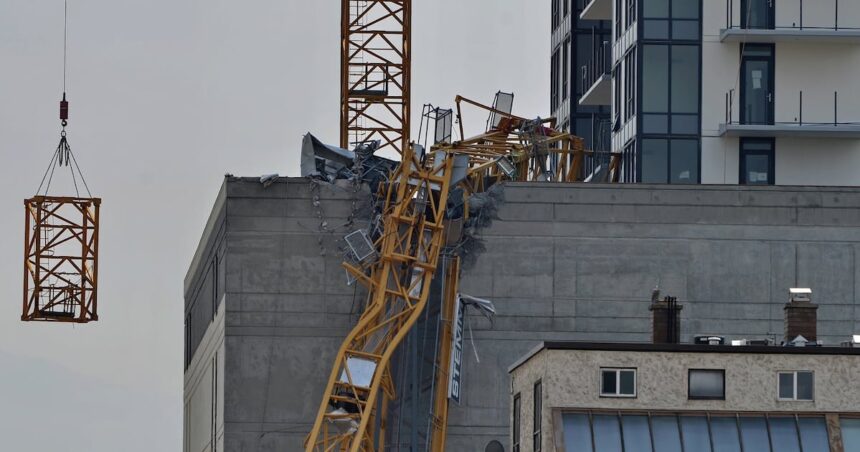Four years after the devastating crane collapse in Kelowna that claimed five lives, families of the victims and union representatives gathered yesterday at the site of the tragedy to demand stronger accountability and safety reforms. The collapse, which occurred during the dismantling of a tower crane at a downtown construction site on July 12, 2021, remains one of British Columbia’s deadliest construction accidents in recent memory.
“We stand here today, four years later, and what’s changed?” asked Tom Sigurdson, former executive director of the BC Building Trades Council. “The families still don’t have closure, the industry still hasn’t fully implemented the safety recommendations, and workers continue to face unnecessary risks on job sites across the province.”
The collapse killed four workers—brothers Eric and Patrick Stemmer, Jared Zook, and Cailen Vilness—along with Brad Zawislak, who was working in an adjacent building when the crane came crashing down. Court documents obtained through freedom of information requests show that WorkSafeBC investigators identified multiple procedural violations during the crane dismantling process, including inadequate engineering oversight and improper sequencing of disassembly steps.
Virginia Vilness, mother of 23-year-old victim Cailen, tearfully addressed the gathering. “My son went to work that morning expecting to come home. Four years later, we’re still waiting for someone to be held responsible. How many more families need to suffer before real change happens?”
A technical safety report commissioned by the provincial government following the incident revealed concerning patterns in crane operations across British Columbia. The report, conducted by independent engineering firm Hansen & Associates, documented that 41% of crane operations reviewed between 2021-2023 had at least one major safety deficiency that could potentially lead to catastrophic failure.
Despite these findings, prosecutions related to the collapse have moved slowly through the justice system. Mission Group Enterprises, the primary contractor on the site, faces four workplace safety charges, with hearings repeatedly delayed. The most recent court appearance in May 2025 resulted in another procedural postponement until September.
“The pace of justice feels glacial when you’ve lost someone,” said Chris Vilness, Cailen’s father. “While cases drag through courts, other workers remain at risk because the industry hasn’t fully absorbed the lessons from this tragedy.”
The International Union of Operating Engineers Local 115, which represents crane operators in British Columbia, used yesterday’s memorial to announce a new safety initiative called “Lift Safe BC.” The program aims to improve training standards and create an anonymous reporting system for crane safety concerns.
“Our members see unsafe practices every day but often fear reporting them,” explained Darcy Sloat, business manager for Local 115. “This new system will allow workers to flag dangerous situations without fear of reprisal. We’ve already secured funding and technical support from WorkSafeBC to launch the platform by year’s end.”
I reviewed engineering assessments and witness statements from the collapse investigation, which indicate that crucial pins were removed prematurely during the dismantling process. Industry experts I interviewed explained that proper crane dismantling requires meticulous adherence to manufacturer specifications and engineering oversight—elements allegedly missing on that fateful day.
According to Rachel Zhou, safety director at the Canadian Centre for Occupational Health and Safety, crane-related fatalities have actually increased nationwide since 2021. “We’ve documented 17 crane-related deaths across Canada in the past four years,” Zhou told me. “Many involved similar issues of improper assembly or dismantling procedures. It suggests we haven’t learned enough from Kelowna.”
The families have established the Kelowna Five Memorial Foundation, which advocates for stricter certification requirements for crane assembly and disassembly specialists. Their proposal has gained support from several construction industry associations, though legislative action remains pending.
BC Labour Minister Janet Coleman, who attended yesterday’s memorial, promised action on the foundation’s recommendations. “We expect to introduce amendments to the Workers Compensation Act this fall that would implement mandatory certification for critical crane operations and increase penalties for safety violations,” Coleman stated.
The families’ lawyer, Marvin Schulman, confirmed they are pursuing civil litigation against multiple parties involved in the crane operation. “While nothing will bring back their loved ones, holding companies accountable creates financial incentives for better safety practices industry-wide,” Schulman explained.
As the fourth anniversary observance concluded, family members placed five white roses at the memorial plaque installed at the site, which has since been redeveloped into a commercial building. The plaque reads: “In memory of five lives lost too soon. May their legacy be a safer tomorrow.“
For the families and colleagues marking this somber anniversary, that safer tomorrow still feels elusive, but their determination to create meaningful change remains undiminished.






